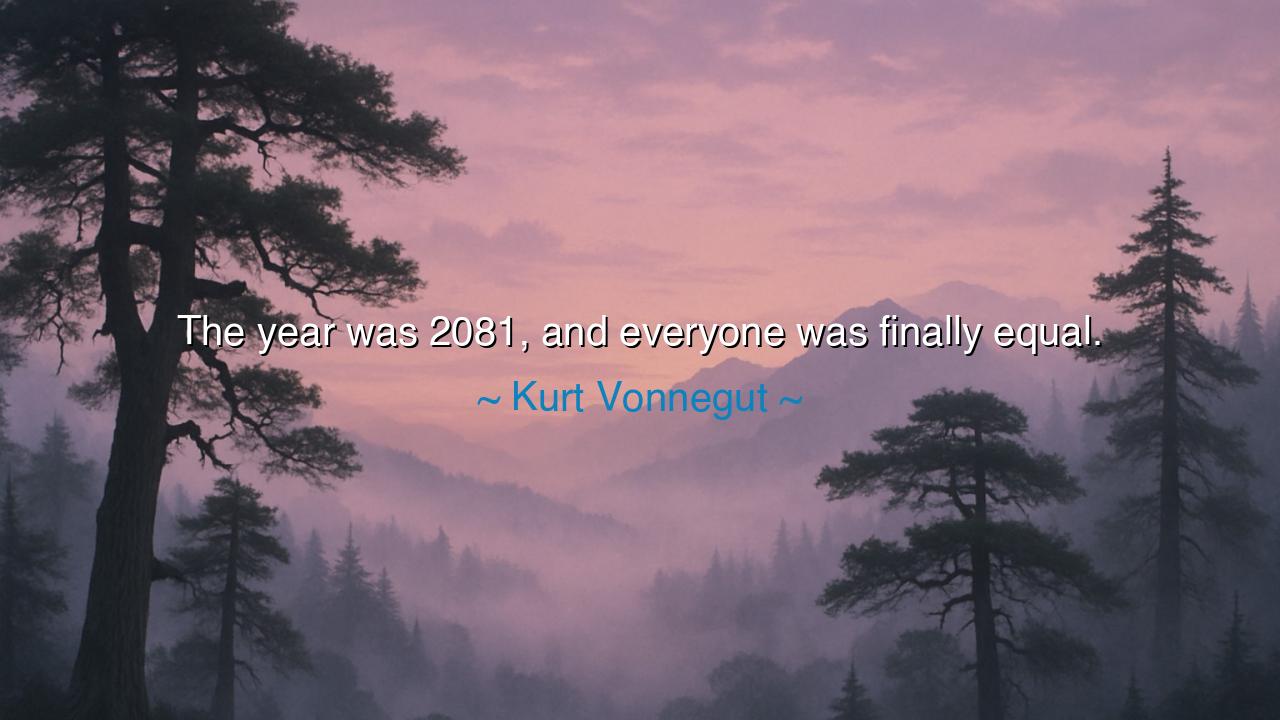
The year was 2081, and everyone was finally equal.






The satirist Kurt Vonnegut, with his pen sharpened against the follies of mankind, opened his short story Harrison Bergeron with the words: “The year was 2081, and everyone was finally equal.” At first, the line sounds triumphant, like the fulfillment of humanity’s greatest dream. Yet Vonnegut, master of irony, meant it as a warning. The equality he described was not the flowering of freedom, but the crushing of excellence. In this imagined future, no man or woman was allowed to be stronger, smarter, or more beautiful than another. To achieve this “equality,” the gifted were shackled, the intelligent were silenced with noise, the graceful were burdened by weight. Thus, the dream of fairness became a nightmare of tyranny.
The meaning of Vonnegut’s line is clear: equality, when misunderstood, can become oppression. True equality is not the leveling of all differences, but the honoring of every soul’s dignity. To make everyone “finally equal” by force is to deny the richness of human variety. In Vonnegut’s tale, the attempt to erase inequality produced not freedom but mediocrity, not harmony but despair. The opening line therefore drips with irony—what should have been a golden proclamation instead becomes a sentence of doom.
History itself testifies to this truth. Consider the French Revolution. The cry for liberté, égalité, fraternité stirred the oppressed to rise against their kings and nobles. Yet when the thirst for equality turned into suspicion of any who excelled, it birthed the Reign of Terror. Men and women of brilliance and vision were guillotined, not because they were unjust, but because they stood out. The pursuit of equality, once noble, became twisted into envy and fear. Vonnegut, looking at the cycles of history, saw how easily a dream could decay into oppression.
And yet, his warning is not despair but counsel. He teaches us that equality must never mean the destruction of difference. To seek fairness is noble, but to force sameness is deadly. Humanity thrives in diversity: in the poet’s verse, in the athlete’s strength, in the thinker’s brilliance, in the craftsman’s skill. To strip away these gifts in the name of equality is to starve the world of beauty and progress. True equality is not in handicapping the strong, but in lifting the weak so that all may flourish.
The deeper wisdom here is that freedom and equality must walk hand in hand. Equality without freedom is tyranny; freedom without equality is chaos. To balance the two requires humility, compassion, and wisdom. Vonnegut’s tale exaggerates the danger to shake us awake: if we seek equality without thought, we may build a world where greatness is forbidden and mediocrity is law. His opening line, then, is not prophecy but parable, urging us to guard against extremes.
The lesson for us is vital. Let us not confuse equality with sameness. Let us defend fairness, but also celebrate uniqueness. Raise up those who suffer under oppression, but do not silence those who shine with brilliance. The table of humanity has room for all—the strong and the weak, the wise and the simple, the gifted and the ordinary. Our task is not to crush differences but to weave them into harmony, where no one is despised, and no one is denied their gift.
Practical wisdom flows from this: in our schools, let us nurture every child according to their talent. In our societies, let us defend the rights of the weak without chaining the strong. In our hearts, let us remember that equality means equal worth, not identical form. If we hold to this truth, we will avoid the bleak future Vonnegut imagined and instead create a world where fairness and freedom walk together.
Thus, let the words of Kurt Vonnegut be passed down as both warning and guide: “The year was 2081, and everyone was finally equal.” May we never build such a future of chains, but instead labor for a world where equality is not the death of greatness, but the soil from which greatness may rise for the good of all.






AAdministratorAdministrator
Welcome, honored guests. Please leave a comment, we will respond soon